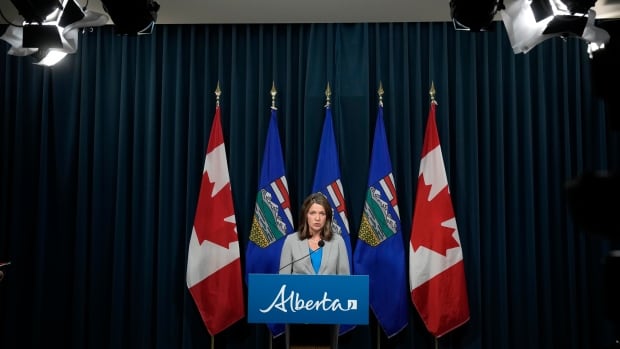
Finn St Dennis believes transgender women deserve to have access to women’s spaces, including sporting leagues.
As a queer researcher and co-founder of an Edmonton climbing collective for LGBTQ people, St Dennis said there is really no evidence to support that transgender women and girls have measurable advantages in sports.
“I don’t believe that the government has any place in legislating the actions of sporting leagues, beyond ensuring that they’re adhering to human rights laws,” they said.
Premier Danielle Smith unveiled changes Wednesday to provincial policies around gender identity, gender affirmation surgeries and new rules for transgender women athletes.
One new policy forbids transgender women from competing in women’s sports leagues. Smith feels transgender women have “unfair advantages” when competing against women and girls who are not transgender.
“It is not beneficial for those women, including those who are transgender, for this divisive and sometimes dangerous situation to continue,” she said in an online video posted to X, formerly known as Twitter.
Smith said the government will work with leagues to set up co-ed or gender-neutral divisions for transgender women athletes so female athletes who aren’t transgender don’t have to compete against “biologically stronger transgender female athletes.”

St Dennis said Smith’s proposed policies frame transgender people as a threat.
“But the real threat, I think, is the harms that these policies are going to have on the trans youth in our society that are really directly impacted by them and their families,” they said.
The premier also failed to provide peer-reviewed evidence for the policies when asked at a news conference on Thursday, something St Dennis said they would have liked to see.
“I know from both the literature and my own research that we have evidence that providing gender-affirming care to trans folks of all ages, including trans youth, improves their health outcomes [and] especially mental health outcomes,” St Dennis said.
Jessica Platt is a former professional hockey player who came out as a transgender woman in 2018 while playing for the Toronto Furies in the Canadian Women’s Hockey League (CWHL).
She was the first transgender woman to play in the league, which folded in 2019.

Platt feels Smith’s proposal is a “gross overreach” and accused the premier of pandering to far-right supporters.
“In her video, she says it’s in the hopes of protecting children, but I can only see it making life worse for trans and gender non-conforming youth,’ Platt said.
When asked by reporters Tuesday if she was looking to gain favour with far-right voters, Smith said her government is supporting kids in their right to make decisions when they’re mature enough to do so.
“We just think that that’s the responsible way of approaching this issue,” Smith said.
Platt doesn’t think Smith’s proposal to create gender-neutral or co-ed teams is realistic since some areas may only have a few transgender athletes.
She also criticized Smith’s argument about transgender women athletes being “biologically stronger.”
“That’s laughable as someone who’s been through transition,” Platt said.
“That type of idea typically comes from people who have the thought that trans women are still men, and retain all the advantages of testosterone, which is not often the case.”
Last year, World Athletics banned transgender women from competing in elite female competitions if they have gone through male puberty. The Canadian Centre for Ethics in Sport has issued guidelines for including trans athletes in Canadian sports.
Allison Sandmeyer-Graves, CEO of Canadian Women and Sport, said Smith’s proposed ban on transgender girls and women from women’s sport categories isn’t backed by evidence, and is out of step with national and international guidelines.

She wishes her organization, as well as others studying ways to support inclusion of trans women and girls in sport, had been consulted by the province.
“In not being consulted, I think we’ve missed a lot of the complexity and nuance that is needed on this topic to get to a great result for everybody,” Sandmeyer-Graves said.
Sandmeyer-Graves said she’s curious how gender-neutral or co-ed spaces for transgender athletes might manifest in small towns.
“The idea that there would be an entire gender-neutral category might actually be great for all genders, but it would absolutely take time to emerge,” she said.
“And in the meantime, it’s effectively exclusion.”
At Issue this week: Alberta introduces new policies restricting access to gender-affirming care for minors and requiring parental consent for pronoun and name changes at school. The Liberals consider a carbon-tax rebrand. Plus, the Conservative party’s record-setting year of fundraising.
Sandmeyer-Graves said conversations around girls and women in sports should be focused on creating the best outcomes for everyone playing in those spaces.
“We strongly recommend that the government actually turn its attention to some of the real barriers that girls and women face in accessing sport,” she said.
St Dennis said they are going to be watching how members of Alberta’s LGBTQ community respond to the policies.
“I was so proud to be an Albertan when we saw pushback against legislation that was going to create harmful policies around GSAs,” St Dennis said.
“I hope that we see that same pushback from Albertans.”
Smith said gender identity can be an emotional issue, especially when it involves children.
“As we move forward developing and implementing these policies into law, I hope we can depoliticize the issue as much as possible and focus on the well-being of the children involved,” she said.



